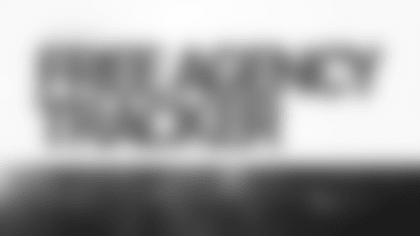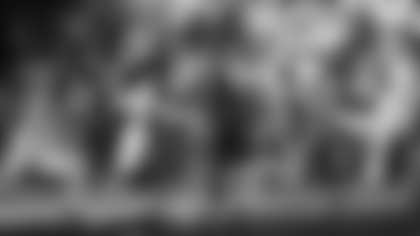With the 2001 season quickly approaching, Jaguars owner Wayne Weaver sat down to discuss the upcoming year, as well as the 2005 Super Bowl, which will be hosted in Jacksonville, and other topics.
RK: For the first time since 1996, the Jaguars are coming off a losing season. Yet, you are very optimistic for the coming season, aren't you?
WW: Obviously, we were disappointed in last season. We had a lot of injuries, and the result was that we had to play a lot of young players that didn't have much experience early in the year. The thing I take away from last year was that we came together, the players that got some game experience were contributing and playing well at the end of the year, and we were winning football games. It served us well to get players game time, and that's going to serve us well this year.
I still believe if you look at our football team and look at our roster, that we have probably more talented athletes on this roster than any other team in the NFL. Then you take that and add the young players that we've added and the speed that we've added, particularly in our special teams, I think we're going to be a very competitive football team this year. What I like is that nobody is expecting much of us this year. Yes, I think we're going to surprise a lot of people.
RK: Exactly how optimistic are you?
WW: If we can stay healthily, we're going to make a run for it again this year. When I say 'make a run for it,' I believe we're going to be a playoff team and I think we have a great chance in the postseason, if we stay healthy, to get to the big game, the Super Bowl.
RK: You don't like losing, do you?
WW: No.
RK: What is losing like for you?
WW: It's bad. It's something we expected in 1995, that coming into the league that we would have to have a couple years that might be losing seasons. We had a model that we stuck to, and fortunately we were successful much earlier than we thought we would be, certainly much earlier than people expected us to be. It's the competitive edge that you build over the years, and working in any business you have to have the attitude that you won't accept anything less than winning. So, yes, it's disappointing when you have a season like we had last year.
The media and some Jaguars fans seem to be pessimistic about this season, that another .500 or so season is inevitable.
I think that's going to serve us well. I'm not so sure our fans feel that way. I think fans looked at last year, they looked at players that have been around for a while and maybe they see as a little older. But I'll tell you, I like the makeup of this football team. I like the experience. I like the youth factor we have on this football team. The key is being healthy in December and playing well. If we can do that, I like our chances.
RK: What will it take, besides being healthy?
WW: We have to have some young players step up. We have to have great special teams play this year, which I think we'll get with the speed we've added with some of our younger players. I think, on defense, with Carnell Lake and Hardy Nickerson being healthy, that's going to make a huge difference. Certainly, Tony Boselli is going to be at 100 percent this year, and everyone knows he wasn't that a year ago. We'll miss a guy like Leon Searcy, but we have some young guys that need a chance to play. They got a chance to play last year, and they stepped up. Fred Taylor's healthy. Mark Brunell's healthier than he's been in a long time. Jimmy Smith is going to be fine, and there's Keenan McCardell, we added Sean Dawkins, and I'm still a big fan of Alvis Whitted. Hopefully, R.J. Soward will come in and contribute to the team this year, but we'll have to wait and see.
RK: Was the idea to keep the core of the team together for one final year?
WW: Yes, to keep the core of the team together, but maybe it won't be for one final year. It depends on how we play. If we have a very successful season, I would think that we're going to try to keep the core of this football team together to make another run at it the following year.
RK: How hard was it to keep the core together? A lot of people expected more changes.
WW: People did expect a lot more changes, and I think people felt that we couldn't get under the salary cap without cutting a lot more of our key athletes. We knew all along that we could do it. It was painful. We had to cut some players that we would rather not have let go, but that's this business. I think it's going to serve us well. I think we've done a good job of keeping the core of this football team together.
The main stars on the team are on the offense, and everyone talks about them. But how good can the defense can be?
I'm not sure all the main stars are on offense. Certainly, when you have Mark Brunell, Fred Taylor, Tony Boselli, Jimmy Smith and Keenan McCardell, those are huge stars on offense. But look on the defensive side of the ball and you think about having guys like Tony Brackens, Kevin Hardy, Gary Walker, Hardy Nickerson and Carnell Lake - those are star players, too. Remember, in 1999 we led the league in defense for, I think, the first 14 games. We were the No. 1 defense in the league. I'm not so sure we can't do that again.
RK: Are you looking forward to seeing what Gary Moeller can do as defensive coordinator?
WW: I like Gary Moeller's style. He likes to bring out a little bit of a nasty streak in the guys. I think he's the kind of coach defensive players like to play for. He's a rough-and-tumble guy. I think he's going to bring out the best of our defense.
RK: Can you compare heading into this season with any of the other previous six seasons?
WW: No, I can't. Coming off a 7-9 season, you scratch your head and wonder 'Can we get back to the level of the year before?' But if you're thoughtful and you analyze your roster on a player-by-player basis, I don't see why we can't get back to that level. We really have the same athletes, although they must stay healthy, and we have some young guys who have already shown this summer that they're going to contribute very quickly. We have some young guys who gained game experience last year that are going to make the difference. So I have high expectations for this football team.
RK: How hard was it for you in the offseason to have to release some players who had been here since 1995, and I'm talking about Joel Smeenge, Leon Searcy, Bryan Barker, Rich Griffith and Brant Boyer?
WW: That's always the worst part of this business. The only thing I can say is that the salary cap and the collective bargaining agreement serve both the player and the team very well. It allows the player to maximize his earning potential. But at some point it also forces the team to make very difficult decisions and make way for younger players. That's the system, so you have to work within it.
RK: Those players I mentioned - and others - made huge contributions to this franchise.
WW: Absolutely. Everyone of those young men I wrote a letter to and told them how much I appreciated their contribution - and not just as football players, but that they've been great people in the community. So there's a little hollow spot left when you see guys who started with you from the beginning and they leave. But, again, it's a system that forces it to work, and you just have to live with the rules and accept it. But players like you mentioned is how you make great traditions. We still include all of our former players who still live in the community in all of our events. I ran into Dave Widell the other day in the lobby, and it's just great to see these guys and visit with them and see that they're doing well outside of football.
RK: Realignment goes into effect in 2002 with a new division. Does the last year of the AFC Central Division mean anything to you?
WW: I look at it basically as we won't be a Central Division after this year but that we'll be a North and a South Division and we've added a couple of new teams. I like the new breakdown of eight four-team divisions. I think I like the new rotation in which we'll play our division opponents home and away for eight games, then rotate four games a year against one of the NFL divisions and then play four games against opponents in the AFC. It's going to take some time to adjust to it, but I think fans are going to like the realignment because they are going to see more teams visiting Jacksonville over the years.
RK: On to another subject. Super Bowl 39 is almost four years away, but what kind of planning is being done for it already?
WW: We had a meeting recently with the chairmen of the host committee, Peter Rummel and Tom Petway, to put together a planning flow chart for the balance of this year, such as target dates. The next assignment is to expand the host committee. We have about 15 key business leaders in the community already, but we need to expand that to probably 60 or 70 people and really get that energized so that by the first of next year we will really be off and running with a full-time paid staff and a full-time president and CEO of the host committee. We have to energize these 60, 70, 80 people that are going to head up these various committees and really get started on the real work that has to be done over the next three years.
RK: You are the majority owner of the Jaguars, but you have seven partners in the franchise. Talk about their involvement.
WW: No. 1, I think I have the best partners of any professional sports franchise. But I must tell you that it's really been a joy to work with this group of men and women, and I say women because my wife Delores is a partner and is involved and very active in the organization through the Foundation. My partners are a source of encouragement as a source of counsel. They are great sounding boards, people like Tom Petway, Laurie DuBow, Preston Haskell, Sandy McArthur, David Seldin, Deron Cherry and my brother, Ron. They are the kind of partners that are willing to roll up their sleeves and do whatever is asked of them. We have a good group here that cares about this community.
I had mentioned the Jaguars Foundation, and Delores is probably as active as anyone in this community in terms of being out, being engaged in the community, speaking and talking about issues that she's passionate about - children's issues, women's issues, the community at large, trying to do good work in the community that makes it a better place for all of us.
And you have to look at the generosity of the partners that allow the Jaguars to fund that effort. We don't go out and fundraise, but just look at the amount of money the Jaguars Foundation has given out over the years - nearly $4 million dollars to many agencies. I don't think you could find another franchise in sports that is doing those kind of things, and you couldn't do that if you didn't have partners that were community-minded in supporting those initiatives.
RK: You were not a full-time resident of Jacksonville when the team was awarded back in 1993, but you have grown very fond of Jacksonville. What do you like about this community?
WW: That's a great question, because I've lived in a lot of cities. When Delores and I first married, we lived in Norfolk, Va, then we went back to our hometown, Columbus, Ga., for a short period of time. Then my company transferred me back to Newport News, Va. and then to the Brown Shoe Cos. home office in St. Louis, and we spent 20 years there. St. Louis was kind of home for us because we were young and that's where our kids were born; that's where our kids grew up. Then we moved to Connecticut when our kids were in middle school and high school and we were there for almost 20 years.
But the thing I like about Jacksonville is the sense of community here that I haven't felt anyplace else. Maybe it's because St. Louis was so much bigger and the little town in which I lived in Connecticut (Darien) was so much smaller. But there's a sense of community here. There's a core of people in this community that are the leaders, people who really have a vision of what they want this community to be. They want it to be a great place to work and raise a family, and they're willing to not only give their time and their money, but they're always out there looking for ways to enhance this community.
Probably the best example was when we got the franchise in 1993. We could have never gotten this franchise in Jacksonville had the community not rallied around that effort. And when I say 'rallied around that effort,' I think the single biggest selling point was when the negotiations broke down and we got it back together, we knew we could not meet the deadline of selling the premium (club) seats according to the NFL's timetable. I told that to the community leaders, and they said 'We'll take that responsibility.' And in 10 days they went out and sold $75 million dollars worth of premium seat tickets. The NFL saw the passion of this community. The attitude of this community when it gets behind an initiative is that they can do anything. The effort to get the Super Bowl was the same thing. And I think the Better Jacksonville Plan is another great example of how this community comes together. How many cities can get a tax increase in this environment today? Mayor John Delaney did it because people in this community saw it as the right thing to do and they saw it as building a better community.
RK: What is it like when you are out in the community? People obviously recognize you. What do they say to you?
WW: 'Thanks for bringing the Jaguars.' 'We're great fans.' 'You guys have done a good job.' Those kind of words of encouragement, and it makes me feel great. Delores and I always stop to take time to say a word back and chat. We appreciate that, and it means a lot that our fans know we care about what they think about the Jaguars and our efforts in the community.














